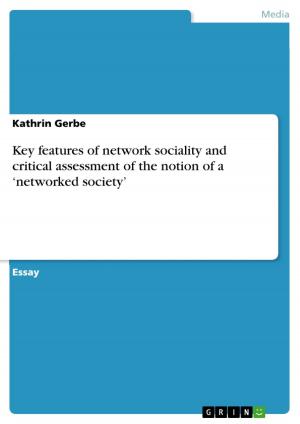Robert Louis Stevenson's 'The Strange Case of Dr. Jekyll and Mr Hyde': A Geography of the Human Mind
Fiction & Literature, Literary Theory & Criticism, British| Author: | Katharina E. Thomas | ISBN: | 9783640930784 |
| Publisher: | GRIN Publishing | Publication: | June 3, 2011 |
| Imprint: | GRIN Publishing | Language: | English |
| Author: | Katharina E. Thomas |
| ISBN: | 9783640930784 |
| Publisher: | GRIN Publishing |
| Publication: | June 3, 2011 |
| Imprint: | GRIN Publishing |
| Language: | English |
Seminar paper from the year 2008 in the subject English - Literature, Works, grade: 1,0, The University of North Carolina at Chapel Hill, course: Victorian Literature, language: English, abstract: Robert Louis Stevenson's novel The Strange Case of Dr. Jekyll and Mr. Hyde presents a landscape that can be read as a geography of the human mind. The two separate dwelling- places of Dr. Jekyll and his alter ego, Mr. Hyde, can be analyzed in psychoanalytical terms as representing the conscious and the unconscious. The suppressed desires of the unconscious, which are related to a discourse of homosexuality underwriting the novel, return to haunt and ultimately destroy the mind of Dr. Jekyll. This paper will examine how the city functions as a mirror of the human mind. It takes a more general approach at first, analyzing different descriptions of the city throughout the novel. As a second step towards establishing the evidence to support the thesis, it will be necessary to take a closer look at the specific geography of Dr. Jekyll's psyche, arguing that the separate dwelling places of Dr. Jekyll and Mr. Hyde represent the conscious and the unconscious in terms of Freudian psychoanalysis. Finally, the paper will examine how this reading allows for an interpretation of Dr. Jekyll's hidden desires as being related to homosexuality. Other interpretations concerning these vices are possible and not mutually exclusive with the one pursued in this paper, as, for example, a reading of Jekyll's mental and physical descent as due to alcoholism and drug abuse. However, a broader analysis taking into account these additional interpretations would be beyond the scope of this paper. It will therefore focuse on the evidence that supports the idea of a homosexual discourse in the novel.
Seminar paper from the year 2008 in the subject English - Literature, Works, grade: 1,0, The University of North Carolina at Chapel Hill, course: Victorian Literature, language: English, abstract: Robert Louis Stevenson's novel The Strange Case of Dr. Jekyll and Mr. Hyde presents a landscape that can be read as a geography of the human mind. The two separate dwelling- places of Dr. Jekyll and his alter ego, Mr. Hyde, can be analyzed in psychoanalytical terms as representing the conscious and the unconscious. The suppressed desires of the unconscious, which are related to a discourse of homosexuality underwriting the novel, return to haunt and ultimately destroy the mind of Dr. Jekyll. This paper will examine how the city functions as a mirror of the human mind. It takes a more general approach at first, analyzing different descriptions of the city throughout the novel. As a second step towards establishing the evidence to support the thesis, it will be necessary to take a closer look at the specific geography of Dr. Jekyll's psyche, arguing that the separate dwelling places of Dr. Jekyll and Mr. Hyde represent the conscious and the unconscious in terms of Freudian psychoanalysis. Finally, the paper will examine how this reading allows for an interpretation of Dr. Jekyll's hidden desires as being related to homosexuality. Other interpretations concerning these vices are possible and not mutually exclusive with the one pursued in this paper, as, for example, a reading of Jekyll's mental and physical descent as due to alcoholism and drug abuse. However, a broader analysis taking into account these additional interpretations would be beyond the scope of this paper. It will therefore focuse on the evidence that supports the idea of a homosexual discourse in the novel.















